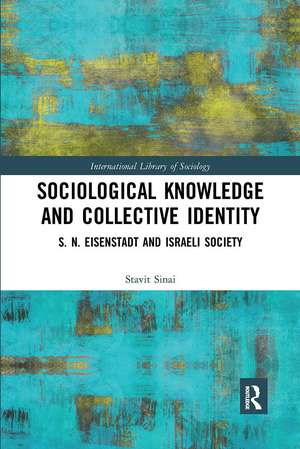Sociological Knowledge and Collective Identity: S. N. Eisenstadt and Israeli Society: International Library of Sociology
Autor Stavit Sinaien Limba Engleză Paperback – 18 dec 2020
The book focuses on Eisenstadt’s sociology of Israel as a case of knowledge construction within an ideological system and examines the relationships between his various sociological analyses of Israeli society and the Zionist imaginary, namely the deeply entrenched political myths and historiographical narratives that constitute Israel’s hegemonic national identity. By emphasizing the interrelation between textuality, identity, and loaded language, the volume seeks to demythologize Eisenstadt’s sociology of Israel. Three major concepts in Eisenstadt’s scholarship are specifically thematized: integration, civilization, and modernities. In each of these foci, the author shows how Eisenstadt’s sociological conjectures reproduce dominant Zionist historiographical representations of the past, rationalize prevalent social hierarchies, reify the boundaries of a national collective "Self", and render legitimacy to Israel’s governing ethnocratic tendencies, underlying the premises of the Zionist settler-colonial project.
Sociological Knowledge and Collective Identity will appeal to those interested in the interconnectedness of sociology and political memory, as well as in a radical postcolonial reconstruction of sociology.
| Toate formatele și edițiile | Preț | Express |
|---|---|---|
| Paperback (1) | 258.50 lei 6-8 săpt. | |
| Taylor & Francis – 18 dec 2020 | 258.50 lei 6-8 săpt. | |
| Hardback (1) | 1000.27 lei 6-8 săpt. | |
| Taylor & Francis – 28 mar 2019 | 1000.27 lei 6-8 săpt. |
Din seria International Library of Sociology
-
 Preț: 356.63 lei
Preț: 356.63 lei -
 Preț: 387.02 lei
Preț: 387.02 lei -
 Preț: 358.40 lei
Preț: 358.40 lei - 15%
 Preț: 404.62 lei
Preț: 404.62 lei - 8%
 Preț: 382.16 lei
Preț: 382.16 lei - 33%
 Preț: 488.64 lei
Preț: 488.64 lei - 34%
 Preț: 1182.96 lei
Preț: 1182.96 lei - 34%
 Preț: 1181.31 lei
Preț: 1181.31 lei - 34%
 Preț: 1042.56 lei
Preț: 1042.56 lei - 31%
 Preț: 328.22 lei
Preț: 328.22 lei - 34%
 Preț: 1348.74 lei
Preț: 1348.74 lei - 34%
 Preț: 1045.20 lei
Preț: 1045.20 lei - 34%
 Preț: 1042.56 lei
Preț: 1042.56 lei - 34%
 Preț: 1404.44 lei
Preț: 1404.44 lei - 34%
 Preț: 1042.56 lei
Preț: 1042.56 lei - 34%
 Preț: 1042.98 lei
Preț: 1042.98 lei - 34%
 Preț: 1045.42 lei
Preț: 1045.42 lei - 34%
 Preț: 1182.54 lei
Preț: 1182.54 lei - 34%
 Preț: 1461.29 lei
Preț: 1461.29 lei -
 Preț: 446.53 lei
Preț: 446.53 lei - 34%
 Preț: 1042.68 lei
Preț: 1042.68 lei - 34%
 Preț: 1404.44 lei
Preț: 1404.44 lei - 34%
 Preț: 1962.29 lei
Preț: 1962.29 lei - 34%
 Preț: 1184.18 lei
Preț: 1184.18 lei - 34%
 Preț: 1042.56 lei
Preț: 1042.56 lei - 31%
 Preț: 352.95 lei
Preț: 352.95 lei - 34%
 Preț: 1407.29 lei
Preț: 1407.29 lei - 30%
 Preț: 332.87 lei
Preț: 332.87 lei - 34%
 Preț: 1350.78 lei
Preț: 1350.78 lei - 34%
 Preț: 1208.76 lei
Preț: 1208.76 lei - 34%
 Preț: 1348.74 lei
Preț: 1348.74 lei - 34%
 Preț: 1181.73 lei
Preț: 1181.73 lei - 34%
 Preț: 1182.96 lei
Preț: 1182.96 lei - 18%
 Preț: 1014.47 lei
Preț: 1014.47 lei - 34%
 Preț: 1185.47 lei
Preț: 1185.47 lei - 34%
 Preț: 1348.74 lei
Preț: 1348.74 lei - 30%
 Preț: 335.39 lei
Preț: 335.39 lei - 34%
 Preț: 1041.33 lei
Preț: 1041.33 lei - 29%
 Preț: 339.90 lei
Preț: 339.90 lei - 31%
 Preț: 341.46 lei
Preț: 341.46 lei - 34%
 Preț: 1043.58 lei
Preț: 1043.58 lei - 18%
 Preț: 1066.09 lei
Preț: 1066.09 lei - 34%
 Preț: 1180.11 lei
Preț: 1180.11 lei - 34%
 Preț: 1184.18 lei
Preț: 1184.18 lei - 34%
 Preț: 1683.16 lei
Preț: 1683.16 lei - 34%
 Preț: 1043.37 lei
Preț: 1043.37 lei - 30%
 Preț: 332.44 lei
Preț: 332.44 lei - 30%
 Preț: 358.44 lei
Preț: 358.44 lei
Preț: 258.50 lei
Preț vechi: 310.65 lei
-17% Nou
Puncte Express: 388
Preț estimativ în valută:
49.47€ • 51.35$ • 41.25£
49.47€ • 51.35$ • 41.25£
Carte tipărită la comandă
Livrare economică 22 martie-05 aprilie
Preluare comenzi: 021 569.72.76
Specificații
ISBN-13: 9780367671044
ISBN-10: 0367671042
Pagini: 204
Dimensiuni: 156 x 234 mm
Greutate: 0.38 kg
Ediția:1
Editura: Taylor & Francis
Colecția Routledge
Seria International Library of Sociology
Locul publicării:Oxford, United Kingdom
ISBN-10: 0367671042
Pagini: 204
Dimensiuni: 156 x 234 mm
Greutate: 0.38 kg
Ediția:1
Editura: Taylor & Francis
Colecția Routledge
Seria International Library of Sociology
Locul publicării:Oxford, United Kingdom
Public țintă
Postgraduate and UndergraduateCuprins
Introduction 1. Eisenstadt, Modern Imaginaries, and the Political Mythology of Zionism Part I: The ‘Problem’ of Social Integration 2. Mediated Identity: Early Eisenstadt, the Zionist Utopia, and the Orientalist Gaze Part II: Civilization 3. The Short Road from Antiquity to Modernity: The Jewish Past and Eisenstadt’s Civilizational Analysis Part III: Modernities 4. The Jewish Democracy and Multiple Modernities 5. From Zionist to Radical Sociology
Notă biografică
Stavit Sinai is a scholar working in the field of sociology of knowledge, memory studies, and postcolonial critique. She earned her doctoral degree in the Department of History and Sociology at Konstanz University. Her paper, "Self and Otherness in Israeli Sociology" was awarded the Junior Scholar prize by the International Sociological Association (ISA, 2014). Other topics of scholarly interest include, inter alia, classical Greek philosophy. Sinai is also a human rights activist.
Recenzii
"Stavit Sinai’s powerful book addresses the postcolonial context of the emergence of the state of Israel and its influence on Shmuel Eisenstadt’s sociology. Widely regarded as the foremost theorist of ‘multiple modernities’, Eisenstadt is also the ‘father of Israeli sociology’. This is a compelling and urgent inquiry into the ways in which national social imaginaries have been central for the development of universal concepts."
- Gurminder K. Bhambra, Professor of Postcolonial and Decolonial Studies at the University of Sussex, UK
- Gurminder K. Bhambra, Professor of Postcolonial and Decolonial Studies at the University of Sussex, UK
Descriere
This book examines the relationships between sociology and projects of national identity construction, and presents a critique of Shmuel N. Eisenstadt, the prominent Israeli sociologist, known as the "father of Israeli sociology".
